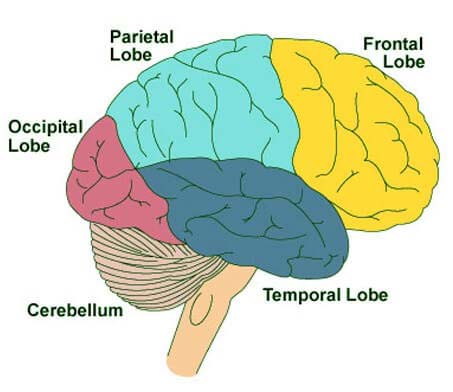
Brain
Brain is the main organ of the central nervous system, protected by the skull. It is composed of the cerebrum, cerebellum and brain-stem. Human brain is the most amazing yet complex organ located close to the primary sensory organs for the senses like smell, sight, touch, taste and hearing. Despite being protected by the thick skull, brain is susceptible to damage and disease. Brain commands and controls the physical and emotional activities of an individuals body, also keep working when the body is at rest. The entire functional understanding of the brain is still an ongoing challenge for Neuroscience instead of the technology advancement.
Brain Anatomy
The average weight of a human brain is from 1.2 to 1.4 kg. Every individual have different size of brain, being measured by weight or volume and not easy to determine the common features. The easiest way to gain information about the brain anatomy is our visual inspection. With the advancement of technology, many other techniques have been developed to study the anatomy of brain. Human brain consists of neurons, glial cells and blood vessels. Living brain is very soft with a gel based substance, referred as a grey matter and the cortex is pinkish-beige in color and slightly off-white from the inside.
Brain Injury Overview
Traumatic brain injury (TBI) is the damage caused by a blow or jolt to the brain can affect the psychological, physical and cognitive functions. TBI includes the causes like falls, accidents or any object penetrating in the brain. TBI can be serious and cause long term ailments. Any kind of injury to the brain is serious but a severe kind of injury to the brain can be lethal. TBI can be categorized according to the type of injury, brain has realized.
• Mild Traumatic Brain Injury (MTBI): MTBI mainly attributed to as concussion, is a loss of consciousness or disorientation for nearly 30minutes. This damage may not be visible in an MRI or CT scan. Symptoms are headache, confusion, lightheadedness, whirling sensation, foggy vision or weary eyes, bad taste, weariness and trouble with memory. MTBI can have long term effects, known as Post-concussion syndrome (PCS). Patients suffering for PCS might experience significant changes in the personality.
• Severe Traumatic Brain Injury (STBI): STBI includes all the MTBI�s symptoms but in this case, the headaches can get worse or do not get away. The other symptoms of STBI are repeated vomiting or nausea, convulsions, inability in waking up from sleep, dilation of one or both pupils, slurred speech, weakness or numbness, can increase more than 30 minutes. It may require surgical intervention.
For TBI, long term treatments and rehabilitation is required. The person suffering from it might require physiotherapy, speech therapy, counseling, social support and appropriate medications. TBI can cause multiple difficulties to the injured person as the brain experience a sudden lurching move which can cause diffuse axonal injury when the nerve cells are torn from one another. Localized damage can also occur if the brain strikes with the skull. Thus, it can result in widespread damage of the brain as the brain deflects inside the skull during the brunt. It cannot be treated by surgery and medicines are required for a long time.